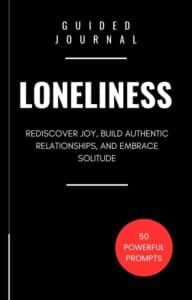Loneliness can be a formidable adversary, creeping into our lives when we least expect it. It wraps its icy tendrils around our hearts, leaving us feeling isolated and disconnected from the world. But solitude, on the other hand, is a powerful ally—an opportunity to embrace our own company and find solace in self-reflection.
In the midst of our fast-paced and interconnected world, carving out moments of solitude can be a profound act of self-care and self-discovery. And what better way to embark on this journey than through the pages of a journal?
Welcome to a world of introspection and self-discovery. In this article, we present to you 50 powerful journal prompts that will guide you on a transformative path to overcome loneliness and embrace solitude. These prompts have been carefully curated to help you explore the depths of your emotions, confront your fears, and uncover the hidden treasures within yourself. Each prompt is a key that unlocks a door to self-awareness, compassion, and growth.
So, grab your journal and a pen, and prepare to embark on a journey of self-discovery. Let the words flow from your heart, as you navigate the labyrinth of your thoughts and emotions. Through these prompts, you will find solace, inspiration, and a renewed sense of connection with yourself and the world around you.
Are you ready to dive deep into the waters of your soul? Let’s begin.
Understanding Loneliness: A Deeper Look into an Emotion We All Experience
Defining Loneliness: Beyond the Surface
Loneliness is a universal human emotion that transcends age, gender, and cultural boundaries. It is an intricate and complex experience that can affect anyone, irrespective of their social status or personal circumstances. Loneliness is often misunderstood as simply being alone, but it goes beyond physical isolation. It is a profound sense of disconnection, where one feels emotionally detached and lacks a meaningful connection with others.
Unraveling the Layers of Loneliness
Loneliness can manifest in various ways, each with its unique characteristics and implications. There are two primary types of loneliness: situational loneliness and chronic loneliness.
Situational loneliness arises from specific life circumstances such as moving to a new city, starting a new job, or going through a breakup. It is a transient form of loneliness that typically fades as the individual adapts to their new situation and forms new connections.
Chronic loneliness, on the other hand, is a persistent and long-lasting experience that often stems from a deeper internal struggle. It can result from factors like a lack of close friendships, strained family relationships, or feeling misunderstood by others. Chronic loneliness can lead to a continuous sense of emptiness and a longing for genuine connection.
The Emotional Impact of Loneliness
Loneliness can have a profound impact on an individual’s mental and emotional well-being. It can give rise to feelings of sadness, anxiety, and low self-esteem. Prolonged loneliness may contribute to the development of mental health conditions such as depression and social anxiety disorder. Moreover, loneliness can exacerbate existing health issues and weaken the immune system, making individuals more susceptible to physical ailments.
Loneliness in the Digital Age
In today’s hyper-connected world, paradoxically, loneliness has become increasingly prevalent. The rise of social media and digital communication has created a virtual sense of connection, but it often lacks the depth and authenticity of real-life interactions. The constant comparison and fear of missing out (FOMO) that social media can trigger further perpetuate feelings of loneliness and inadequacy.
Finding Solace in Connection
While loneliness can be a distressing emotion, it also serves as a reminder of our fundamental need for connection and belonging. Recognizing and acknowledging our feelings of loneliness is the first step towards addressing them. Building and nurturing meaningful relationships, engaging in activities that bring joy and fulfillment, and seeking support from friends, family, or professionals can help alleviate the burden of loneliness.
Embracing Solitude: The Power of Self-Reflection
It is important to distinguish between loneliness and solitude. Solitude is a conscious choice to spend time alone and can be a valuable opportunity for self-reflection, personal growth, and rejuvenation. Embracing solitude can provide a chance to reconnect with oneself, rediscover passions, and develop a deeper understanding of one’s own needs and desires.
The Journey Towards Connection
Overcoming loneliness is a process that requires patience, self-compassion, and resilience. It involves taking small steps towards building meaningful connections, whether through joining clubs or organizations, attending social events, or engaging in hobbies that foster interaction. It is essential to remember that forming connections takes time and effort, but the rewards of genuine companionship and a sense of belonging are worth it.
Loneliness is an intricate emotion that touches the lives of many. By understanding its complexities, acknowledging our own feelings, and actively seeking connection, we can navigate through loneliness and cultivate a fulfilling and meaningful life. Remember, you are not alone in your loneliness, and there are always opportunities for genuine connection if we are willing to embrace them.

Journaling: Your Path to Overcoming Loneliness and Transforming Your Life
Are you tired of feeling isolated and lonely? Do you yearn for connection and a sense of purpose? If so, journaling might just be the transformative tool you need. In this chapter, we will explore the profound benefits of journaling and how it can help you overcome loneliness. By embracing this powerful practice, you can unlock your inner thoughts, emotions, and dreams, ultimately leading to a deeper understanding of yourself and the world around you.
Understanding Journaling: Unleash the Power of Self-Expression
- Definition of Journaling: Journaling is the act of writing down your thoughts, feelings, and experiences in a personal journal or diary.
- A Safe Space for Self-Expression: Your journal becomes a sanctuary where you can freely express yourself without judgment or fear of rejection.
- The Power of Reflection: Through journaling, you become an active observer of your own life, gaining valuable insights into your thoughts, behaviors, and patterns.
Overcoming Loneliness: The Healing Journey Begins
- Acknowledging Loneliness: Loneliness is a universal experience that can affect anyone, regardless of age or background.
- The Isolation Paradox: In our hyper-connected world, true connection often eludes us, leaving us feeling lonelier than ever.
- Journaling as a Coping Mechanism: Writing in your journal allows you to externalize and process your emotions, providing solace and comfort during times of loneliness.
The Transformative Benefits of Journaling
- Self-Discovery and Awareness: Journaling helps you explore your inner landscape, uncovering hidden desires, fears, and dreams.
- Emotional Healing and Catharsis: By putting your thoughts and emotions onto paper, you release their weight, allowing for healing and growth.
- Problem-Solving and Clarity: Journaling provides a structured space to analyze challenges, brainstorm solutions, and gain clarity on your life’s path.
- Gratitude and Positivity: Focusing on gratitude and positive experiences in your journal cultivates a mindset shift, boosting your overall well-being.
- Building Self-Trust and Confidence: Regular journaling builds a strong bond with yourself, fostering self-trust and confidence in your decisions and abilities.
Practical Tips for Journaling
- Set Aside Regular Time: Dedicate a specific time each day or week for journaling to establish a consistent habit.
- Create a Sacred Space: Find a quiet and comfortable place where you can immerse yourself in the journaling process.
- Choose the Right Medium: Explore different journaling mediums, such as pen and paper or digital platforms, to find what resonates best with you.
- Be Authentic and Vulnerable: Embrace honesty and vulnerability in your journaling, allowing yourself to explore your deepest thoughts and emotions.
- Experiment with Different Techniques: Try prompts, freewriting, or creative exercises to spark your creativity and deepen your self-exploration.
By embarking on the journey of journaling, you have the power to overcome loneliness and transform your life. Through self-expression, self-reflection, and self-discovery, you will uncover a newfound sense of connection, purpose, and fulfillment. So, grab your pen and journal, and let the transformative journey begin. Remember, you are not alone, and your journal will be your faithful companion on this path to personal growth and happiness.

Journal Writing Prompts for Loneliness
Imagine you are stranded on a deserted island with no one around. How does this solitude make you feel? What aspects of loneliness do you experience in this scenario?
Recall a time when you felt lonely in a crowded room. Describe the emotions that arose and reflect on why you felt disconnected despite being surrounded by people.
Write a letter to your future self, expressing the loneliness you are currently experiencing. What advice would you give yourself to overcome this feeling?
Imagine you are a character in a book or movie who embodies loneliness. Describe this character’s thoughts, feelings, and experiences. How does their story resonate with your own?
Create a metaphor or symbol that represents loneliness to you. Explain its significance and how it relates to your personal journey.
Reflect on a childhood memory that evokes feelings of loneliness. How does this memory shape your understanding of loneliness in your present life?
Write a dialogue between your inner critic and your inner confidant regarding your experience of loneliness. What arguments or insights do they offer?
Describe a place that makes you feel lonely. What is it about this location that accentuates your feelings of isolation? How could you transform this space into one that brings comfort and connection?
Write a poem or short story that captures the essence of loneliness. Use vivid imagery and emotions to convey the experience to your readers.
Imagine meeting your future self who has successfully overcome loneliness. What advice, strategies, or insights does your future self share with you?
Reflect on the impact of social media on your feelings of loneliness. How does comparing your life to others on social platforms contribute to your sense of isolation?
Write a list of activities or hobbies that bring you joy and connection. How can you incorporate them into your life to combat loneliness?
Imagine you have the power to create a support group for lonely individuals. Describe the structure, activities, and purpose of this group. How would it help you and others overcome loneliness?
Reflect on the role of vulnerability in combating loneliness. How can embracing vulnerability lead to deeper connections and a sense of belonging?
Write a letter to someone who has experienced loneliness, offering them empathy, understanding, and advice based on your own experiences.
Imagine you have the ability to travel back in time and provide comfort to your younger self during a lonely period. What would you say or do to provide solace and encouragement?
Reflect on the impact of societal expectations and cultural norms on feelings of loneliness. How can you challenge these expectations and create a sense of belonging on your own terms?
Write a short story where the protagonist discovers that their loneliness is a result of their own perception. How does this realization transform their life?
Reflect on the role of self-compassion in combating loneliness. How can you be kinder to yourself and cultivate a sense of self-worth and belonging?
Describe a dream or aspiration that you have kept to yourself due to fear of judgment or rejection. How does keeping this dream hidden contribute to your feelings of loneliness?
Write a letter to someone who has played a significant role in your life, expressing how their presence has helped alleviate your loneliness. Share specific instances or qualities that have made a difference.
Reflect on the connection between self-esteem and loneliness. How can building your self-esteem help you overcome feelings of isolation?
Imagine you are a detective investigating the root causes of your loneliness. What clues would you look for? How would you solve the mystery?
Write a dialogue between your present self and your younger self, exploring the experiences and events that have contributed to your loneliness. What wisdom or reassurance does your present self offer?
Reflect on the difference between being alone and feeling lonely. How can you embrace solitude and find contentment within yourself?
Imagine you are a painter tasked with creating a masterpiece that captures the essence of loneliness. Describe the colors, shapes, and emotions you would incorporate into your artwork.
Write a poem or song lyrics that express the complex emotions of loneliness. Focus on the rhythm and imagery to evoke a visceral response.
Reflect on the impact of past relationships on your experience of loneliness. How have these relationships shaped your beliefs and expectations regarding connection and companionship?
Describe a fictional world where loneliness is nonexistent. What does this world look like? How do people interact and form meaningful connections?
Write a letter to a future generation, sharing your experiences and insights about loneliness. What lessons or advice would you pass on to help them navigate their own feelings of isolation?
Reflect on the connection between creativity and loneliness. How can creative outlets such as writing, painting, or music help alleviate feelings of solitude?
Imagine you have the power to create a community dedicated to combating loneliness. Describe the values, activities, and support systems that would be integral to this community.
Write a short story where the protagonist discovers an unexpected source of companionship during a period of intense loneliness. How does this newfound connection transform their life?
Reflect on the impact of childhood experiences on your current feelings of loneliness. How have early relationships and dynamics shaped your understanding of connection and isolation?
Describe a symbol of hope that represents the possibility of overcoming loneliness. How does this symbol inspire you to keep searching for connection?
Write a letter to your loneliness, expressing your frustrations, fears, and hopes. Imagine it as a separate entity and engage in a conversation with it.
Reflect on the role of gratitude in combating loneliness. How can cultivating a sense of gratitude for the people, experiences, and moments in your life help alleviate feelings of isolation?
Imagine you have the power to rewrite your personal narrative regarding loneliness. What alternative story would you tell? How would this revised narrative empower you?
Write a list of qualities or characteristics that you value in a friend or companion. How can you embody these qualities and attract like-minded individuals into your life?
Reflect on the connection between self-care and loneliness. How can prioritizing your physical, emotional, and mental well-being help you combat feelings of isolation?
Describe a fictional character who embodies resilience in the face of loneliness. What lessons can you learn from this character’s journey?
Write a letter to a younger version of yourself who is currently experiencing loneliness. Offer guidance, reassurance, and advice based on your present experiences.
Reflect on the impact of societal stigmas surrounding loneliness. How can you challenge these stigmas and create a more compassionate and understanding environment for yourself and others?
Imagine you have the power to transform loneliness into a physical object. What would it look like? How would you interact with it?
Write a poem or short story that explores the beauty and transformative power of solitude. How can embracing alone time foster self-discovery and personal growth?
Reflect on the role of technology in combating loneliness. How can you leverage technology to connect with like-minded individuals and build a support network?
Describe a mentor or role model who has played a significant role in helping you navigate feelings of loneliness. How have their guidance and wisdom influenced your perspective?
Write a letter to your future self, envisioning a life free from loneliness. Describe the relationships, experiences, and emotions you hope to cultivate.
Reflect on the impact of societal pressures and expectations on feelings of loneliness. How can you redefine success and prioritize authentic connections over external validation?
Imagine you are hosting a gathering centered around combating loneliness. Describe the activities, conversations, and atmosphere of this event. How would you ensure that attendees leave feeling less alone?
Download Printable Journal Prompts (PDF) >>
Guided Journal for Loneliness
50 Powerful Writing Prompts to Rediscover Joy, Build Authentic Relationships, and Embrace Solitude

Loneliness can be a heavy burden to bear. It’s a universal human experience that can leave us feeling isolated, disconnected, and longing for meaningful connections. But what if there was a way to navigate through this emotional journey, to find solace, and to reconnect with ourselves and others? Introducing the Guided Journal for Loneliness – a transformative tool designed to help you embrace healing and connection. This journal is your companion on the path towards rediscovering joy, fostering self-compassion, and building authentic relationships.
The Weight of Loneliness
Loneliness has become a pervasive issue in our modern society. With the rise of social media and digital communication, we are more connected than ever, yet genuine human connection seems to be slipping away. Loneliness can manifest in various forms – from feeling disconnected in a crowd to experiencing the ache of solitude in the absence of companionship. It can affect anyone, regardless of age, background, or circumstances.
The Emotional Toll
Loneliness can take a toll on our mental, emotional, and physical well-being. It can lead to feelings of sadness, anxiety, and low self-esteem. It can contribute to a lack of motivation, creativity, and overall life satisfaction. Without addressing the root causes of loneliness, it can become a persistent cycle that hinders personal growth and fulfillment.
Self-Reflection and Understanding
The Guided Journal for Loneliness delves deep into the intricate layers of your emotions, thoughts, and experiences. Through thought-provoking prompts and reflective exercises, it encourages you to explore the root causes of your loneliness, unraveling the layers that perpetuate the feeling of isolation. By shining a light on your inner world, this journal empowers you to gain a deeper understanding of yourself, your needs, and your desires.
Breaking Free from Negative Patterns
Loneliness often stems from negative patterns and limiting beliefs we hold about ourselves and others. This journal provides a safe space for you to challenge these patterns, question your assumptions, and rewrite your narrative. It guides you towards embracing self-compassion, nurturing a positive mindset, and cultivating healthier habits that foster authentic connections.
Cultivating Self-Awareness and Growth
The Guided Journal for Loneliness offers a structured framework to help you cultivate self-awareness and personal growth. With carefully crafted exercises, it encourages you to explore your values, strengths, and passions. It helps you identify areas in your life where you can find joy, purpose, and fulfillment. By nurturing a deeper connection with yourself, you lay the foundation for building meaningful relationships with others.
The Guided Journal for Loneliness is more than just a book; it’s a transformative companion on your journey towards healing and connection. By addressing the problem of loneliness, and providing a compelling solution, this journal guides you towards embracing joy, fostering self-compassion, and building authentic relationships. Discover the power of self-reflection, break free from negative patterns, and redefine your experience of loneliness. Embrace healing, connection, and a renewed sense of purpose with this empowering guided journal. Begin your transformative journey today.
As we reach the end of this journaling journey, take a moment to reflect on the insights you have gained, the emotions you have explored, and the growth you have experienced. The act of journaling is a powerful tool for self-discovery and self-empowerment. It has allowed you to confront your loneliness, embrace solitude, and uncover the hidden depths of your being.
But remember, this journey is not finite. It is an ongoing process—a lifelong commitment to nurturing your relationship with yourself. So, as you close your journal and step back into the world, carry the lessons you have learned with you. Cherish the moments of solitude, for they are opportunities for self-reflection, creativity, and growth. Embrace the power of connection, both with yourself and with others.
And now, as you ponder the pages you have filled, consider this:
How will you integrate the lessons of solitude into your daily life? How will you nurture your relationship with yourself and find moments of connection in the midst of a bustling world?
The answers lie within you, waiting to be discovered. So, pick up your pen and continue writing the story of your life—one journal entry at a time.

